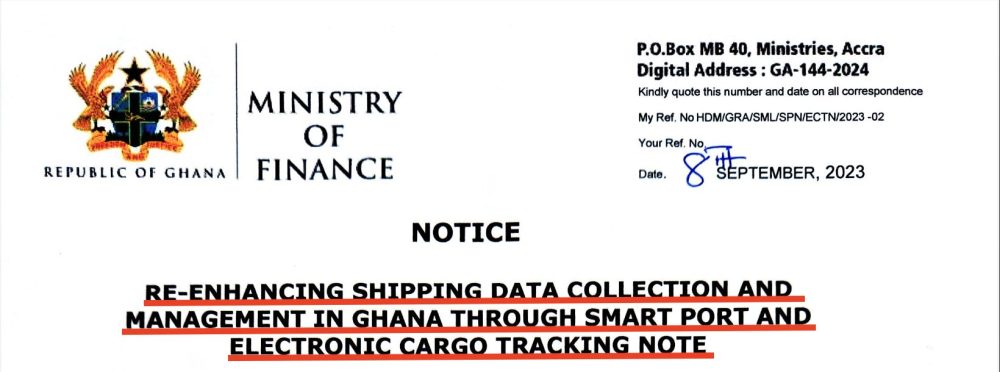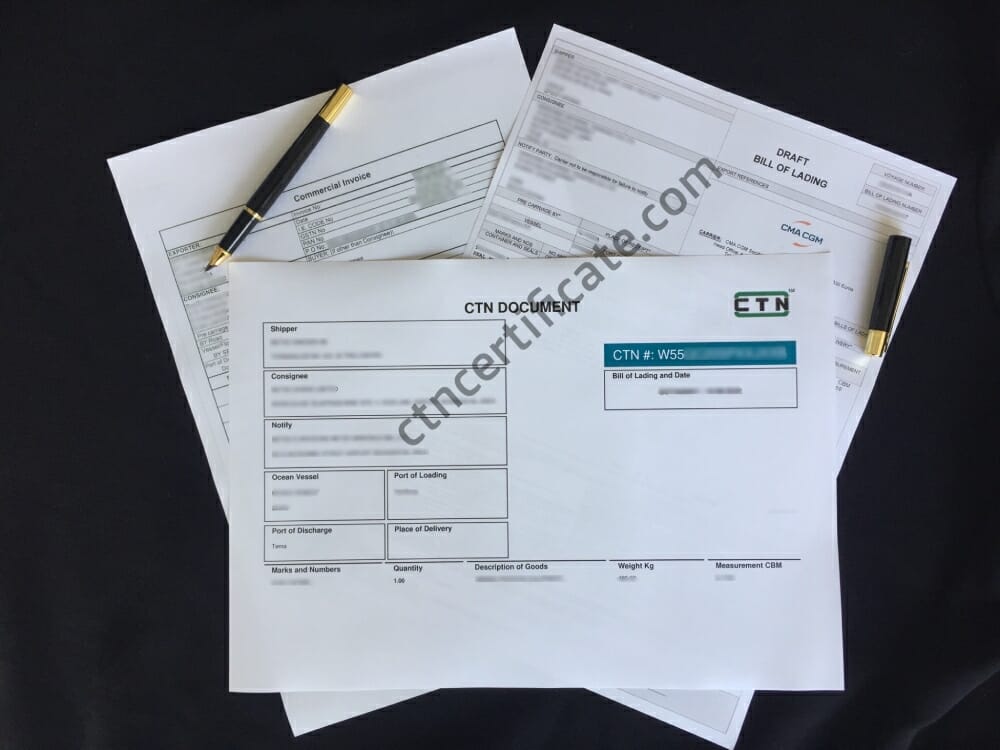As of November 1, 2023, all shipments to Ghana, including those in transit, must obtain a required Electronic Cargo Tracking Number/Smart Port Note (ECTN/SPN) from the ports of loading.
Every shipment to Ghana, whether for Tema or Takoradi ports, is obliged to be accompanied by a CTN certificate. Any shipment arriving at a Ghanaian port without this certificate will face severe consequences and a penalty. However, if your shipment’s final destination isn’t Ghana, the certificate is not necessary and won’t cause any issues.
Click here to learn more about transit shipments.
Disclaimer: Please note that it is crucial to verify with your importer or customs agent in Ghana if this certificate is necessary for your cargo, as there have been recent contradictory information regarding the Ghana ECTN/SPN certificate. Once the procedure has started, funds are not refundable, and any issues arising after the waiver’s pre-validation phase are not our responsibility.
We offer Ghana CTN certificates for United States .
Despite its mandatory and crucial role in the process, the ECTN certificate is often one of the most overlooked certificates.
Notice From Ghana Ministry of Finance and Economic Planning (MOFEP)

What is Ghana CTN?
CTN stands for Cargo Tracking Note, and its name is quite self-explanatory. It is a certificate that equips authorities with the ability and information necessary to effectively track, manage, and supervise shipments from loading to discharge. Additionally, it provides them with valuable details about the cargo even before its arrival. The CTN contains comprehensive information about the shipment, including details about the exporter, importer, and the goods being transported.
What are the required documents?

- Bill of Lading: It contains details about the exporter, the importer, the weight of the goods, the shipping line, the vessel name, etc.
- Commercial Invoice: It includes details of the goods, the freight cost, the incoterm, and some other charges if there is any, etc.
- Freight Invoice: This is only a required document if the freight cost isn’t on the commercial invoice.
- Export Customs Declaration: This is a document that is prepared by the customs officials of the exporter country and lists the goods getting transported and has a detailed description of them.
- Packing List: This document contains all the details of the goods, especially the total weight.
What are the consequences of not having a CTN certificate?
CTN certificate must be validated five days before the vessel’s arrival at the latest. If not, you will be facing a fee twice the amount of the certificate’s cost plus a regulation charge determined by the Ghana Customs Officials.
Pricing
Certificate cost depends on the number of Bill of Ladings and the containers, the country of origin, the port of discharge, etc. This is why we can’t give you an exact price for the CTN. But if you share your shipment’s details with us we can provide you the best charges for your certificate. We offer free quotation.
How long does it take to get Ghana CTN certificate?
We provide draft Ghana CTN certificate within 24 hours. We provide certificates to exporters all over the World.
Which ports in Ghana require (cargo waiver) CTN certificate?
All ports require CTN certificate in Ghana, including the Top 5:
- Port of Tema:
The Port of Tema is the largest and busiest port in Ghana. Located near the capital city, Accra, it serves as a major hub for both containerized and general cargo. It handles a wide range of commodities, including containerized goods, dry bulk cargo, liquid bulk cargo, and general goods. - Port of Takoradi:
Situated in the city of Sekondi-Takoradi, the Port of Takoradi is Ghana’s second-largest port. It is a major export point for commodities such as cocoa, minerals (including oil), timber, and agricultural products. The port also handles imports of general cargo and containers. - Tema Oil Refinery (TOR) Harbour:
The TOR Harbour, located within the Port of Tema complex, is dedicated to handling petroleum-related products. It serves as a crucial point for the import and export of petroleum and petroleum products in Ghana. - Port of Dawa:
The Port of Dawa is a recently developed port located in the southeastern part of Ghana. It primarily serves as a transshipment point for goods moving to and from neighboring landlocked countries like Burkina Faso and Niger. - Port of Ada:
The Port of Ada is a small but important port in Ghana. It primarily serves the fishing industry and handles fishery-related activities such as fish processing and export.
What are the most imported items in Ghana?
- Petroleum Products: Including crude oil, gasoline, diesel, and other refined petroleum products.
- Machinery and Mechanical Appliances: Including machinery parts, generators, pumps, and electrical machinery.
- Vehicles and Automotive Parts: Including cars, trucks, motorcycles, and their components.
- Electrical Machinery and Equipment: Including electronic devices, appliances, and telecommunications equipment.
- Pharmaceuticals and Medical Supplies: Including medicines, medical instruments, and healthcare products.
- Iron and Steel Products: Such as iron rods, steel structures, and construction materials.
- Rice: Rice is a staple food in Ghana, and a significant quantity is imported to meet domestic demand.
- Plastics and Plastic Products: Including plastic materials, packaging, and plastic articles.
- Textiles and Clothing: Including fabrics, garments, and apparel.
- Chemical Products: Including chemical substances, fertilizers, and industrial chemicals.
Which countries are the biggest exporters to Ghana?
- China
- United States
- Nigeria
- India
- United Kingdom
- Netherlands
- Germany
- Belgium
- France
- Italy
- South Africa
- Brazil
- Turkey
- United Arab Emirates
- Malaysia
- Canada
- Spain
- Switzerland
- Singapore
- Japan
Partners and Affiliates




